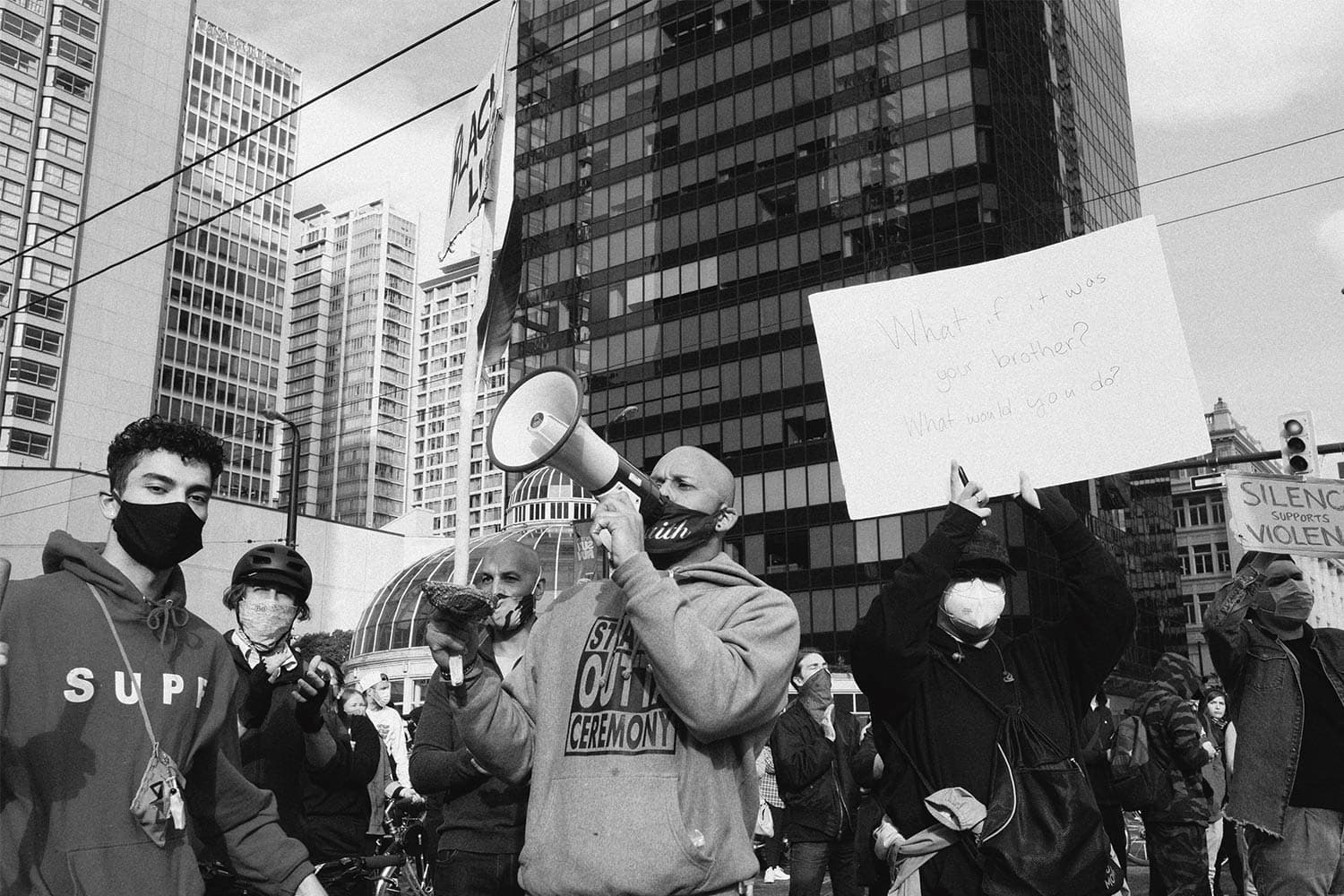Therapists owe Marginalized Clients More than Empathy
Some counsellors believe solidarity can fill important gaps when serving populations dealing with oppression.
People gathered in downtown Vancouver, BC, for the Black Lives Matter Rally in May 2020
The zeitgeist tells us that empathy has transformative powers. Social work researcher Brené Brown says “empathy fuels connection” and helps us support each other in non-judgemental ways. And she’s gained a huge following with this message, resulting in multiple bestselling books, two widely shared TED talks, two weekly podcasts, and consulting gigs for the likes of Pixar and Google.
If I asked you to imagine what a therapist does, you might think “practicing empathy,” too. But for therapists like Ji-Youn Kim and Travis Heath, empathy is insufficient when serving clients from marginalized communities.
Kim is a counsellor and coach based in Vancouver, BC, and Heath is a psychotherapist and professor at the University of Denver, but both say social-movement historian Robin Kelley influenced their understanding of empathy. “[Kelley says] that empathy is more about the empathizer,” according to Kim, “and requires a sense of sharedness or similarity.”

Therapists Ji-Youn Kim (left) and Travis Heath (right) both say empathy isn’t enough to support clients from marginalized communities.
But therapists and their clients don’t always share similar experiences. “I’ve had those experiences where I’d have a white therapist offer empathy when I’m talking about racial trauma,” remembers Kim, who has Korean ancestry. “Sure, you can empathize with me, but… how are you showing up for your responsibilities in dismantling white supremacy?”
“One of the first things I was taught was to practice empathy,” Heath said in a 2021 online workshop. “It’s not that I think empathy is of no value or not helpful at all,” he clarified in an interview. “Empathizing with the client from my ivory tower might feel kinda good, but it… doesn’t contribute to any sort of greater social change.”
“Empathy and support… are ideas that are often associated with therapy and what therapists do,” says Kim. But, she explains, most of her clients’ marginalized identities — including being racialized, queer, and trans — mean they need more from her. “Colonial violence, white supremacist violence, heteropatriarchal violence, it’s constant in their lives. And it often feels really lacking to only offer empathy.”
Solidarity instead
Kim and Heath both think solidarity is a better alternative. Solidarity, Kim says, starts by “[recognizing] our differences and how we perceive the world differently, and even how we are perceived differently.” It’s “inherently rooted in politics, power dynamics, and systemic issues,” filling the gaps left by empathy.
She says encountering the work of Dr. Jennifer Mullan — a Black clinical psychologist who focuses on decolonizing therapy — and reading Mullan’s phrase “politicize your practice” was an epiphany: “Oh, I’m allowed to be a political therapist. Thank goodness.”
“If we’re thinking about solidarity,” says Heath, “it requires me to take action out in the world… As a cisgender man, for example, if I’m working with a trans client, in what ways am I actively standing against transphobia in the world? What actions am I taking when I see cisgender men who disproportionately cause harm in our societies? In what ways am I noticing those same tendencies in myself and moving to change them?”
Now, in her sessions, Kim asks clients: “What would it look like for me to show up in solidarity with you beyond this apolitical empathy and support?” Questions like this have resulted in new practices, like the community-based support networks Kim creates with clients at risk of being in crisis. The client’s friends and family individually sign up for a time slot to be with them, so they’re not alone. Kim says the networks came into being because of her own experiences: “When I went through… times of suicidality, I had ten friends who were constantly available to show up when needed.”
If we’re thinking about solidarity, it requires me to take action out in the world.
Programs like these replicate the helpful aspects of, say, a psych ward. But — because they’re rooted in community and consent — they avoid the harmful impacts of detaining, surveilling, and policing people struggling with mental health.
Heath also recognizes the need for therapists to reimagine their practices, to think outside the clinical spaces of their sessions, and to move forward from therapy’s problematic histories: “To me, all good psychotherapy is experimental,” he says. “I don’t know how we can be using ideas from 70 years ago, predominantly from white men, and be expecting those ideas to meet the current moment of history we’re in.”
He’s been politicizing his practice over the last few years, and has created community-centred approaches to working with people going through the American legal system. In his work with a client who had a criminal conviction, Heath invited the client’s family members, parole officer, and sentencing judge to a session where they recognized the client’s talent as a rapper and affirmed that identity, instead of focusing on the “criminal” label imposed on him. Heath says this kind of collective approach helps clients reimagine themselves and heal, because the people around them are reimagining them, too.
Beyond the counselling couch
Solidarity has shaped how Kim does therapy, but it also informs how she lives outside of sessions. For example, Kim co-organized a workshop on processing rage with Black Lives Matter Vancouver co-founder Cicely Belle Blain that redistributed funds to Black and Indigenous mutual aid. Kim says that providing paid therapy isn’t her only responsibility as a justice-oriented counsellor.
But even if therapists were to widely adopt solidarity into their practices and lives outside of work, larger problems still loom. Kim and Heath agree that the mental-health industry isn’t talking nearly enough about how it’s complicit in exploitative capitalism.
“Rather than… addressing issues like white supremacist violence, or houselessness, or gender-based violence,” says Kim, “governments, institutions, employers keep sending people to therapy.” The mental-health industry is growing as a result of this flow of clients and cash.
Rather than addressing issues like white supremacist violence or houselessness, governments and employers keep sending people to therapy.
“If we really want to address mental-health issues, we’ve got to address the root causes,” Kim says. “If we keep feeding the mental-health industry, then [it] just becomes another huge corporation.”
Heath says this issue keeps him up at night. But he says creating community-based systems of mental-health care has an “anti-capitalist bent” because it sets up people to care for one another rather than rely on the mental-health industry alone. “Part of what I’m trying to do,” Heath says, “is… try and find out what works for them within their communities, with their ancestors, and their histories.”
Print Issue: Spring 2022
Print Title: When Empathy's Not Enough
